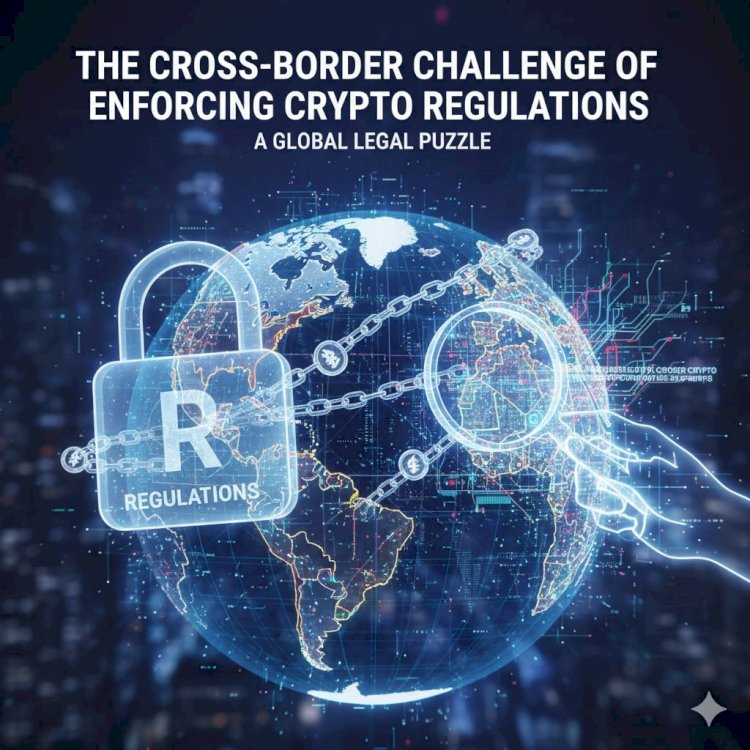The Cross-Border Challenge of Enforcing Crypto Regulations

By Dr. Pooyan Ghamari, Swiss Economist and Swiss Visionary
The Borderless Blockchain Revolution
Cryptocurrencies have shattered traditional financial boundaries, enabling instant transactions across continents without intermediaries. Bitcoin, Ethereum, and thousands of altcoins operate on decentralized networks that ignore national borders, empowering individuals while frustrating regulators. This borderless nature creates immense opportunities for innovation but poses a profound enforcement dilemma: how do sovereign states police a system designed to evade control?
Why Traditional Rules Fail in a Global Ledger
National regulations rely on jurisdiction—laws apply within defined territories. Yet blockchain ledgers are replicated across thousands of nodes worldwide. A transaction initiated in Tokyo can be validated in New York and settled in Dubai within minutes. Imposing fines or bans in one country does little when users simply relocate their operations or wallets to friendlier shores. This regulatory arbitrage allows bad actors to exploit gaps, laundering funds or evading taxes by hopping jurisdictions like digital nomads.
The Patchwork of Global Responses
Countries have adopted wildly divergent approaches. Some embrace crypto with open arms, crafting clear frameworks to attract investment and talent. Others impose outright bans, driving activity underground into shadowy exchanges. In between lie hybrid models with strict licensing, anti-money laundering mandates, and investor protections. This fragmentation turns enforcement into a game of whack-a-mole: suppress it here, and it pops up there, often in less regulated havens.
Technology Outpacing the Lawmakers
Innovation in crypto moves at lightning speed—decentralized finance (DeFi) platforms, non-fungible tokens (NFTs), and layer-2 scaling solutions emerge faster than legislatures can debate them. Regulators, bound by slow bureaucratic processes, draft rules for yesterday's technology while tomorrow's breakthroughs render them obsolete. Smart contracts execute automatically, enforcing terms without human oversight, but who holds accountability when code glitches or exploits billions?
The Human Element: Anonymity vs. Traceability
Pseudonymity is crypto's double-edged sword. Wallet addresses obscure real identities, complicating investigations into fraud or terrorism financing. Advanced analytics can trace flows on public blockchains, yet privacy coins and mixers deliberately obfuscate trails. Enforcers must balance innovation's privacy benefits against the risks of untraceable crime, all while international cooperation lags behind the tech's global reach.
Forging International Alliances in a Fragmented World
Effective enforcement demands unprecedented collaboration. Bilateral agreements fall short; multilateral bodies could standardize reporting, share intelligence, and harmonize sanctions. Imagine a global task force monitoring cross-border flows in real time, blending AI-driven surveillance with human expertise. Such unity requires trust among nations with competing interests— a tall order in geopolitics—but without it, regulations remain toothless proclamations.
The Economic Stakes: Boom or Bust?
Crypto's market capitalization fluctuates wildly, influencing global liquidity and investment flows. Stringent enforcement in one region can trigger capital flight, starving local economies of blockchain-driven growth in jobs, startups, and tax revenue. Conversely, lax oversight invites scams that erode public trust, potentially crashing markets and deterring legitimate adoption. Striking the right balance could unleash trillions in value; missteps risk systemic instability.
Innovative Tools for a New Enforcement Era
Emerging technologies offer hope. Regulated stablecoins pegged to fiat currencies provide stability with built-in compliance hooks. Centralized exchanges enforce know-your-customer (KYC) protocols, acting as gateways to the decentralized wilds. Blockchain forensics firms already partner with law enforcement, unmasking illicit patterns through sophisticated data analysis. These tools transform enforcement from reactive punishment to proactive prevention.
Vision for a Harmonized Future
The cross-border challenge is not insurmountable—it's an invitation to reinvent global governance. By prioritizing interoperability, incentivizing compliant innovation, and fostering dialogue among stakeholders, we can craft regulations that protect without stifling. Crypto's promise lies in financial inclusion and efficiency; enlightened enforcement will ensure it delivers on that vision for generations to come. The ledger awaits our collective wisdom.

 content-team
content-team 


















